- Home
- Suzanne Selfors
Smells Like Pirates Page 14
Smells Like Pirates Read online
Page 14
“Yes, clearly.”
“I don’t believe it.”
Madame leaned back in the red throne. “Homer doesn’t matter right now. What matters is the map. Where’s Gertrude?”
“She had a little accident,” Torch said in a humdrum way. “We were standing on the deck, and she suddenly toppled overboard. I tried to save her—really I did.” The corners of her mouth turned up slightly. “But all that jewelry pulled her right down to the bottom.”
Homer shivered as silence filled the lair. Gertrude was dead? Possibly murdered? Even though she was a traitor, this was a major loss to the organization. The L.O.S.T. membership was dwindling by the day.
“I see you are in the process of reassembling the map,” Madame said. “I will be there shortly to assist you.”
“No,” Torch blurted out.
“No?”
“That’s right. No.” Torch’s brow knitted, and she glared into the camera. “I don’t need your help. So what if you’ve escaped? I have the map. I have Gertrude’s yacht. I don’t need you anymore. The plan has changed.”
“The plan has changed?” Madame repeated. She darted to her feet with so much gusto that the throne fell backward. “The plan has changed?”
Torch winced, as if Madame’s fury had reached through the screen and slapped her.
“Do not forget, you tattoo-covered nitwit, that I’m the one who created the plan,” Madame said, pointing a finger at the screen. “The girl is working for me. I persuaded her to go to the Pudding farm. I told her about the map. Then I called you and Gertrude and told you to offer your services to her. I told her she could trust you two. She was idiotic enough to give you the map—that’s her fault. But I’m the one behind this, so never ever forget who’s in charge. You wouldn’t have the map if not for me.”
Homer’s fingers turned white as he gripped a porthole. Lorelei was working with Madame la Directeur? Maybe he shouldn’t have been shocked. After all, she’d worked for Madame before.
But Madame thought Lorelei had given Rumpold’s map to Gertrude and Torch. So that meant that Lorelei was double-crossing Madame. Homer clenched his jaw. She would try to double-cross him, too. No doubt about it. She was playing a game with everyone—a game comprised of her own rules for her own benefit. No matter how many promises or pacts she made, Lorelei wanted the treasure for herself and no one else.
Well, Homer could play games of lies and deception, too. At least he thought he could. He’d never really tried, but right then and there, he knew it was necessary. He’d have to stoop to Lorelei’s level. Homer W. Pudding, nephew of Drake H. Pudding, wasn’t about to let Rumpold Smeller’s treasure, a treasure the entire world was waiting for, fall into Lorelei’s greedy hands. No way. No way!
“You don’t scare me,” Torch said from the flat-screen. Her hawk appeared and pecked at the camera lens. “You’re an escaped convict. I’m going to call the police and tell them where you are.”
“You don’t know where I am,” Madame said, folding her arms and smirking with satisfaction.
“Whatever,” Torch said, pushing the hawk aside. “It doesn’t matter that you’ve escaped. I don’t need you. That’s the point. I have the map.”
“Oh, but you do need me.” Madame picked up the red throne, brushed off its cushion, then sat. Resting her hands on the armrests, she spoke in a steadier, calmer voice. “You haven’t put the map together. You’re having trouble.”
“I ain’t having trouble,” Torch insisted. “It’s just that there are a lot of pieces.”
Madame made a tsk-tsk sound as she shook her head. “My dear Torch, you’re not a map reader. You don’t come from a treasure-hunting family. Your head is filled with fantasies about Atlantis. That’s why you’ve never found a single thing in your life. You need my expertise. I can put the map together.”
The hawk leaped onto Torch’s shoulder and nuzzled her cheek. Torch, deep in thought, stroked the hawk’s head. Then she stared at all the map pieces lying in front of her. “Okay, fine. You can help me.”
“Then we’ll have to get rid of the girl,” Madame said. “She knows too much. And the boy, too.”
Homer’s heartbeat pounded at his temples.
“Those kids ain’t my problem. All I care about is the treasure.” Torch uncapped a glue stick. “So, if we’re going to put this map together, I want to make a new plan. This time it’s just you and me. Deal?”
“Deal,” Madame said. Torch gave her directions to Gertrude’s yacht. Then Madame reached out and turned off the screen. “ ‘You and me,’ ” she said with a snicker. “Until, of course, it’s just me.”
No one really knows how many people have perished in the attempt to find Rumpold Smeller’s treasure. Treasure hunting, in general, is a dangerous activity. As Homer well knew, treasure hunters often live exciting though abbreviated lives. The book The Worst Ways to End a Treasure Hunt is all about exciting though abbreviated lives. In a future edition, Drake Pudding’s untimely death by carnivorous tortoise would be added. Gertrude Magnum’s death by falling overboard would be added as well. If Madame la Directeur had her way, Homer and Lorelei would follow.
A sick feeling rose in Homer’s gut, and a sour taste filled his mouth. Maybe it was because he’d swallowed a bit of lake water while swimming. Or maybe it was because he’d just overheard his überenemy say she was planning to “get rid” of him.
Homer waited in the murky water, his jaw shivering, his legs itchy. Madame would be leaving soon to join Torch. Then he’d climb into the submarine. Then he’d tell Lorelei that he knew she’d been working for Madame. Then he’d grab Dog and Hercules and forget all about Lorelei, forget all about their L.O.S.T. and FOUND pact. He didn’t need her. He was the one who’d pasted the map back together. Hercules had translated the riddle. Angus MacDoodle had calculated the coordinates. Lorelei hadn’t done anything. Yes, that’s what he’d do. Somehow he’d leave Lorelei behind.
Except for one thing—Lorelei knew the riddle and the coordinates. And she could go straight to Madame and Torch with the information. And if she went straight to Madame and Torch, they’d “get rid” of her. He sighed. As much as he distrusted her, she’d once been his friend. And no matter how many bad things she did, those friendship feelings were as stubborn as a herd of goats in a lettuce patch—there was no way to budge them.
Homer’s thoughts scattered as Madame la Directeur hurried from the back room. She’d changed into professional treasure-hunting clothing, which looked exactly like the clothing Homer owned, so it had probably been made by Mr. Tuffletop. There was a pair of khaki shorts, a forest-green shirt, a khaki vest, knee-length leech-proof socks, brown leather boots, and a leather belt with the initials M.L.D. on the buckle. She stood in front of a mirror and pulled a Panama hat over her black hair. No one would recognize her as the woman plastered on the front page of the newspaper.
“Time to show those amateurs that they’ve met their match,” she said. Then she stomped up the staircase. Her steps echoed long after she’d disappeared through the tortoise exit.
Homer’s hands trembled as he untied the submarine’s mooring line. With a grunt, he climbed onto the deck. The sub was shaped like a biscuit with a thick candle sticking out of the top. The biscuit part was the sub’s body, and it floated just below the water’s surface. The thick candle was actually a wide metal pipe called a conning tower, with a hatch on top. Homer climbed a ladder and opened the hatch. Then he climbed down another ladder into the sub’s body.
As he stepped off the ladder, the first thing he noticed was a gold wall plaque.
LA MADAME
Designed by Ajitabh for Drake Horatio Pudding to navigate the deep sea in search of treasure
The submarine had been named after Madame la Directeur? Homer scowled, reading the plaque again. Uncle Drake had once been in love with Madame, so it made sense that back in those days, Ajitabh would have named the submarine after Drake’s girlfriend. Homer shuddered. No way would he ever call it
La Madame. As soon as the quest was finished, he’d get a new plaque and rename it The Drake.
The next thing he noticed was a metal tank built into the back wall. A label affixed to the tank read SEAWEED PROCESSING BIOFUEL UNIT. A switch on the tank read UP FOR ENGINE. DOWN FOR UNDERWATER BATTERY. Homer thought about this for a moment. Ajitabh had created a unit that sucked seaweed from the ocean and turned it into fuel. The fuel powered the engine while the submarine cruised at the surface. Then the battery took over when submerged. How very clever.
A little room off the side was labeled THE HEAD. Homer knew this was a seafarer’s way of saying “bathroom.” Another door read SUPPLY LOCKER and another SEAFLOOR EXIT. Three seats were mounted at the bow, each facing a curved observation window. The middle seat had a steering wheel that looked like it had come off a tugboat.
Homer sat in the pilot’s seat, his gaze scanning the panel of buttons before him. Ajitabh had affixed a tidy label beneath each button, but even so, the idea of driving a submarine was daunting. It would have been much easier to have Ajitabh at the controls, but that was not going to happen. Homer was on his own. So he carefully read each of the labels until he found what he believed was the first step in the process. ENGINE ON. When he pushed the button, it glowed green. The submarine rattled so loudly it sounded like the inside of a kettledrum. But then the noise subsided to a steady hum.
As he pondered the next step, his gaze rested on a throttle that jutted from the console right next to the steering wheel. There was a similar throttle in his dad’s old red truck that made the truck go forward and backward. With a tug, he pulled the throttle down. The engine roared and the submarine shot backward, slamming into the end of the lair’s pool. Homer pushed the throttle up. The engine roared and the submarine shot forward, crashing into the opposite side of the pool. Homer cringed. At this rate, he’d break the thing into pieces before leaving the lair.
It took a bit of practice, but he finally figured out how to ease the throttle into position. Gripping the wheel, he drove down the tunnel, leaving the lair behind. When the gate came into view, Homer pulled the throttle to neutral. Then he climbed up the ladder and stuck his head out of the hatch.
“Hey, Lorelei! Open the gate!” She did, and Homer drove the submarine into City Lake.
When he climbed out of the hatch, warm August air blew across his face. “Hi, Homer,” Hercules called from the paddleboat. Dog barked and wagged his tail.
“You did it!” Lorelei called. She pumped her legs, paddling quickly toward the sub. “You got it. Did you see Madame? Is she in there?”
Homer glared at the pink-haired girl in the pink jumpsuit. He wanted to yell at her, wanted to tell her he knew she’d been working with Madame. But if she knew that he knew, then she’d be ready for the time when he’d double-cross her. He stepped onto the sub’s deck. “Yeah, I saw her. But she’s gone now.”
“Where’d she go?” Lorelei asked.
“I don’t know,” he said with an innocent shrug. “I didn’t talk to her. I was hiding.”
“Did she seem upset?” Lorelei asked as the paddleboat pulled up alongside the submarine. “I changed a bunch of things in her lair. Did she notice?”
“Oh, she noticed,” Homer said.
With a grunt, Dog heaved himself over the side of the paddleboat and landed on the deck next to Homer. Hercules followed and handed Homer his clothing. Then Lorelei stepped onto the deck. She gave the empty paddleboat a shove, sending it toward the far side of the lake, where the rental stand awaited.
Dog peered into the water and growled as the whale shark circled the sub. “Thanks for getting Speckles,” Lorelei said.
“What are you going to do with him?” Homer asked.
“Well, it should be easy. He’ll follow us down the river, and when we reach the ocean, he’ll be free.” She climbed up the ladder and disappeared through the hatch.
“Can you help me get Dog up that ladder?” Homer asked Hercules.
“Yeah, no problem.” Hercules scooped Dog up and started up the ladder. “Do you have life jackets on board?” he asked. “I sure hope so.”
Before climbing back inside the submarine, Homer stood at the top of the ladder and scanned the view. More joggers had appeared on the lake’s distant shore. An ice cream truck drove past crowded benches. The skyscrapers loomed beneath a blue cloudless sky. Homer W. Pudding was about to leave The City behind and head for open ocean. Am I crazy to do this? he wondered.
His uncle’s voice rolled through his mind: “It is a sad truth of human history that those who dare to be different are often judged to be not quite right in the head.”
Homer smiled, suddenly remembering that he was about to embark on a quest while wearing only his boxers. Maybe I am just a tiny bit crazy.
“Hey, where’s Daisy?” Lorelei’s voice boomed from the bottom of the ladder.
Homer glanced down the conning tower. Lorelei was holding out her arms as if the gray rat would jump into them at any moment.
All the anger Homer felt toward Lorelei, that churning pin-prickly sensation that had made his heart race and had made him feel as if he were standing in the eye of a storm, all of that receded like a dream.
“Lorelei,” he said gently after he’d climbed down the ladder and looked into her big eyes, “I have some bad news.”
As it turned out, the pin-prickly sensation that covered Homer’s skin wasn’t caused by his anger toward Lorelei. It was an unpleasant side effect from swimming in the City Lake water.
“It’s not the worst rash I’ve ever seen,” Hercules pointed out. “But if those little bumps turn into pustules, then you’re going to be miserable. I sure wish I had my first-aid kit.”
“Me, too,” Homer said with a moan.
The mood inside the submarine was somber at best. Definitely not the sort of mood that should befall a trio of intrepid adventurers who were setting out to find the world’s most coveted pirate treasure. Where was the joy? The excitement? Where were the delirious fantasies as they imagined how their lives would change? But the reality was this: While Homer sat on the submarine’s floor in a state of itchy despair, Lorelei was curled up in the corner, her arms wrapped around her legs, deep in grief.
Homer had delivered the news of Daisy’s death, but he’d avoided the gory details—especially the shovel-whacking bit. “I can’t believe she’s gone,” Lorelei said, her lower lip trembling.
Homer didn’t know if he should hug Lorelei or stand next to her and say things like, “It’s going to be okay. There, there. Don’t cry.” How do you help someone feel better when she’s lost her pet rat? When she’s lost the only other member of her family?
Anyone who has spent time with an animal knows that an animal can be loved as much as a person. Sometimes even more. Homer knew this. Besides the obvious reasons to love an animal—their cuteness, their cuddliness, their all-around appeal—animals are loyal beyond measure. They don’t tell lies. They don’t work out elaborate ways to double-cross. And they most certainly don’t sneak into bedrooms and steal things from secret compartments under beds.
But here’s their most impressive quality—animals accept you for who you are. They don’t care if you have a blueberry-sized mole on your face. They don’t care if you have to shop in the Husky Boys’ section at Walker’s Department Store or if you’re homeless.
So when Homer’s ugly rash made its appearance, Dog lay down next to him and rested his chin on Homer’s lap.
“Look what I found,” Hercules cried from the supply locker, where he’d been rooting around. He brought out a red metal box. “It’s a first-aid kit!” Kneeling next to Homer, he opened the kit. “Hmmmm. This isn’t anything like mine.”
While Hercules’s first-aid kit was designed for those who live on land, this kit was designed for those who live underwater. Pill bottles had labels like OXYGEN RELEASERS, SUNLIGHT VITAMINS, and SHARK REPELLANT. Droppers were labeled SALTWATER EYEBALL SEALER, PLANKTON WASH-AWAY, and BARNACLE BE GONE. Tub
es contained PRUNE PREVENTION CREAM FOR FINGERTIPS AND TOES, JELLYFISH PHEROMONES, and OCTOPUS ANTISUCTION OINTMENT.
“Hey, this might work,” Hercules said as he opened a tube. “It says it’s a gel for jellyfish stings.” He squeezed a glob into Homer’s open palm. The goo was green and smelled like something one of the farm dogs might have rolled in, but Homer didn’t care. If the itching lasted one more minute, he’d rip his skin right off. So he spread the gel all over his legs, arms, belly, and neck. Hercules applied it to Homer’s back. The relief was instantaneous.
“Thank you,” Homer said after a long, happy sigh.
Skin soothed and boxers dried, Homer dressed in his jeans and plaid shirt. He stayed barefoot because it didn’t make much sense to wear shoes on a submarine. Lorelei and Hercules had taken off their shoes, too.
Hercules found a box of rations in the storage locker. He, Homer, and Dog each ate three energy bars. “I’m not hungry,” Lorelei mumbled. She turned away and rested her face against a small porthole.
Homer knelt beside Dog and whispered in his ear. “Go sit with Lorelei. Go cheer her up.” He gave Dog’s rump a push. Dog waddled across the sub and, with a grunt, lay across Lorelei’s feet. Homer always appreciated that same gesture on cold mornings. Dog made the best slippers in the world.
But Lorelei turned away from Dog. “Leave me alone,” she mumbled. “I’m too sad to pet you.”
“What do we do now?” Hercules asked as he closed the first-aid kit.
Homer wasn’t sure how to cheer up Lorelei. So he turned his thoughts back to the quest. “I guess we’d better start driving this thing.”
The autopilot mechanism wasn’t too difficult to figure out. Homer typed in the destination’s coordinates. The control-panel screen lit up. Point A represented their current location, and Point B represented their destination. A black dot, which represented the submarine itself, began to pulse.
Homer took the pilot’s seat. Hercules took the seat at Homer’s right, his seat belt tightly buckled. Speckles swam in and out of view as they made their way to the river that fed City Lake. It wasn’t a wild, churning river with jutting rocks and grizzly bears pawing at spawning salmon. City River had been dammed-up so that it formed a wide, calm waterway, perfect for the delivery of goods from all over the world.

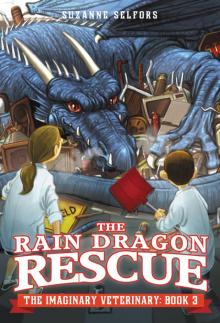 The Rain Dragon Rescue
The Rain Dragon Rescue Ginger Breadhouse and the Candy Fish Wish
Ginger Breadhouse and the Candy Fish Wish Ever After High: Lizzie Hearts and the Hedgehog’s Hexcellent Adventure: A Little Shuffle Story
Ever After High: Lizzie Hearts and the Hedgehog’s Hexcellent Adventure: A Little Shuffle Story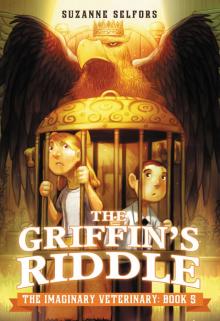 The Griffin's Riddle
The Griffin's Riddle Smells Like Pirates
Smells Like Pirates Duchess Swan and the Next Top Bird
Duchess Swan and the Next Top Bird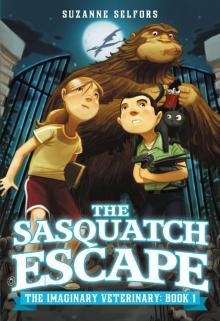 The Sasquatch Escape
The Sasquatch Escape Hopper Croakington II and the Princely Present
Hopper Croakington II and the Princely Present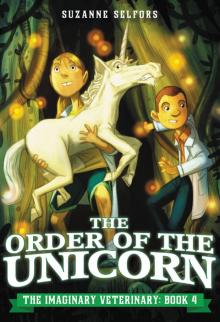 The Order of the Unicorn
The Order of the Unicorn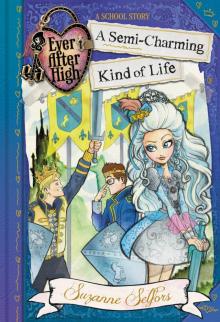 A Semi-Charming Kind of Life
A Semi-Charming Kind of Life Braver
Braver Kiss and Spell
Kiss and Spell Wedgie & Gizmo
Wedgie & Gizmo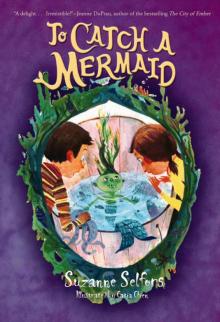 To Catch a Mermaid
To Catch a Mermaid Dexter Charming and the Trouble with Jackalopes
Dexter Charming and the Trouble with Jackalopes The Sweetest Spell
The Sweetest Spell CoffeeHouse Angel
CoffeeHouse Angel Wish Upon a Sleepover
Wish Upon a Sleepover Smells Like Dog
Smells Like Dog Ever After High
Ever After High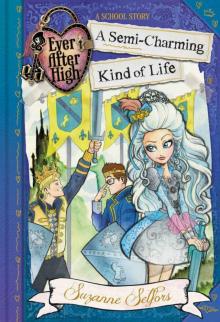 Ever After High: A Semi-Charming Kind of Life
Ever After High: A Semi-Charming Kind of Life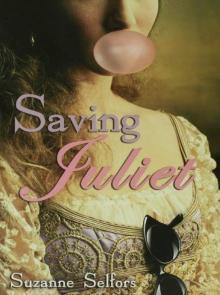 Saving Juliet
Saving Juliet Darling Charming and the Horse of a Different Color
Darling Charming and the Horse of a Different Color Wedgie & Gizmo vs. the Toof
Wedgie & Gizmo vs. the Toof Spirit Riding Free--The Adventure Begins
Spirit Riding Free--The Adventure Begins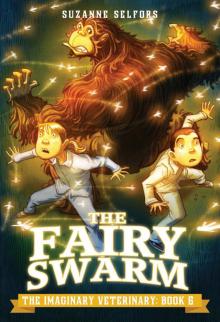 The Fairy Swarm
The Fairy Swarm Ever After High: Next Top Villain: A School Story
Ever After High: Next Top Villain: A School Story Fortune's Magic Farm
Fortune's Magic Farm The Lonely Lake Monster
The Lonely Lake Monster Spirit Riding Free--Lucky and the Mustangs of Miradero
Spirit Riding Free--Lucky and the Mustangs of Miradero Smells Like Treasure
Smells Like Treasure Mad Love
Mad Love